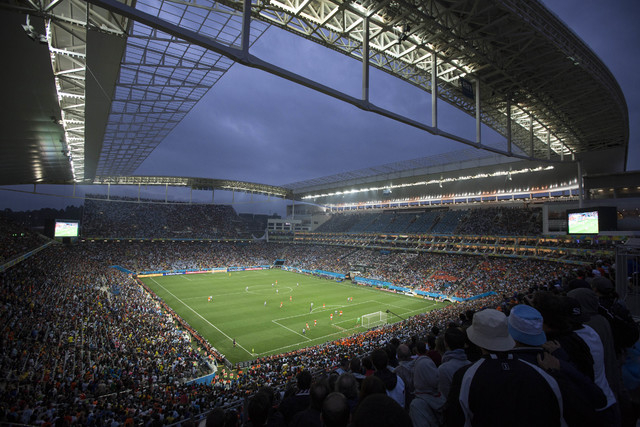U.S. loves soccer but can’t play it — yet
Now that the final match is set, that it has been decided Germany will play Argentina for the championship of the World Cup on Sunday, that Brazil as a host nation will mourn its national team’s disastrous semifinal loss for years to come, it’s important to separate fact from fiction with American soccer.
Simply, that the increased enthusiasm about the game nationally shouldn’t be confused with the perceived improvement of the U.S. team.
Fact: Soccer isn’t on its way to America. It’s here. It made it.
An estimated 21.6 million watched Belgium eliminate the Americans on U.S. television and another 1.7 million watched online. The ratings were better than the NBA Finals between San Antonio and Miami and last year’s World Series between Boston and St. Louis, prime-time events in basketball and baseball as opposed to a soccer match in the middle of a weekday.
Grant Park in Chicago. Wall Street Plaza in Orlando, Fla. Power &Light District in Kansas City, Mo. Tens of thousands gathered across the country to watch the U.S. play in the World Cup, to cheer it through the Group of Death and into the knockout stage.
We have more people playing the sport than anywhere else in the world except Germany. Mexico plays a handful of midweek friendlies in the States each year that average more than 50,000 fans.
At any time, a majority of American households can watch play from the world’s best leagues. Viewership annually climbs for the Premier League and events such as the European Championships. Soccer is a global society. Americans know the names Wayne Rooney and Lionel Messi and Cristiano Ronaldo. They watch.
Major League Soccer is not the big leagues. It’s the wrong tool from which to gauge interest. Ratings for it reflect the level of play, which is dreadful in spots, mostly a collection of B-level talent.
But we are a country of immigrants and of those who grew up playing the game, who understand it, who feel a love and sense of attachment to it.
Soccer is here. Has been for some time.
Fiction: Our national team is exponentially better than at any point in its history.
It’s not close to being so. It’s improved and yet sort of the same.
It’s true our style of play is defined by those values — effort, determination, work ethic — held in the highest regard by Americans. It’s true the team that reached a knockout stage at this World Cup owned that never-give-up spirit.
It’s also true our country still has never produced a world-class field player, that our youth system develops kids to play in college and not on a global stage, that this most recent U.S. team led the World Cup in defensive clearances and ranked only better than Iran in possession time.
Belgium has at least 15 world-class players. It has subs who play for the likes of Chelsea and Liverpool.
We have none.
Belgium had 27 shots on goal against the U.S. in the round of 16.
In its next match, Belgium had one against Argentina.
Think of it this way: A kid in America walks onto a high school basketball court for the first time and doesn’t need to be taught how to dribble behind his back. He just knows how. He has done it countless times during pickup games growing up. His moves are patterned after LeBron James and all the other NBA stars he religiously watches on TV.
That’s the soccer kid everywhere else in the world. His pickup games are with his feet, in the park and on the street and anywhere he can improve his skill. He isn’t on the best travel teams because Mom and Dad write a check; he’s invited by the best clubs because of his talent and then must continue improving or risk being cut.
He doesn’t get to 18 and play college soccer — 20 or so games a season, three or four months of practice. He’s a professional by then. It’s his life. It’s 24/7. It’s his identity.
His way out of poverty is on a pitch, not shooting at a basket.
No sport can mask an inferior team’s deficiencies like soccer. The U.S. was dominated for much of the World Cup, and yet if Chris Wondolowski converts a point-blank chance in stoppage time against Belgium, the Americans would have had a quarterfinal date against Messi and Argentina on a Saturday afternoon.
Think about that. Think of those TV ratings. Think of the passionate and patriotic sense of exhalation such a moment would have created in the U.S.
That’s what it will take to really understand how far the U.S. remains from soccer glory and how difficult it is to achieve. That sort of incredible snapshot. That sort of trigger a deep World Cup run ignites.
I’m sure we have the desire for it.
I’m not sure we will ever have the players.
Many have said it time and again: We are a soccer-playing nation, not a soccer nation. There’s nothing wrong with that, as long as fact and fiction are rightly separated from the equation.
We love soccer. We’re just not very good at it.
Not really. Not to the level many believe.
Las Vegas Review-Journal sports columnist Ed Graney can be reached at egraney@reviewjournal.com or 702-383-4618. He can be heard from 11 a.m. to 2 p.m. Monday through Friday on “Gridlock,” ESPN 1100 and 98.9 FM. Follow him on Twitter: @edgraney.




























